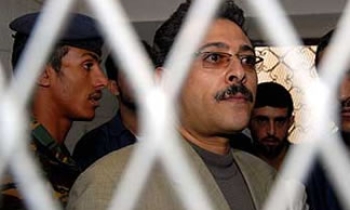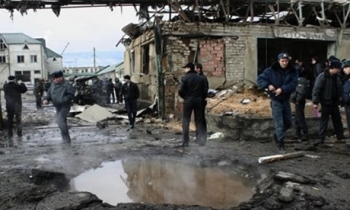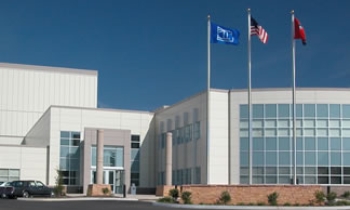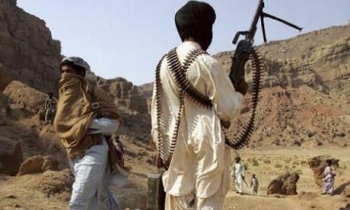WASHINGTON, DC, United States (UPI) -- Reports from Moscow suggest that one of the last independent media outlets in Russia, the business daily Kommersant, is to be bought by the state-controlled Gazprom giant. This is depressing news for supporters of Russian democracy who understand that even the dwindling remnant of Russia`s once-boisterous free press has been an important counter to the spreading power of the Kremlin.
There are few media voices left that dare to criticize President Vladimir Putin`s administration, or to pay serious attention to his political opposition. Two of them, the newspaper Izvestia and the radio station Ekho Moskvy, are already mainly owned by Gazprom. The other main bastions of Western-style press freedoms are the small but influential Moscow daily Nezavisimaya Gazeta and the gazeta.ru website.
Excellent journalists and good journalism continue to flourish in Russia. But they do so in an increasingly grim climate as the high oil price gives the Kremlin unexpected windfalls of wealth, which helps to keep Putin`s approval rating at around 68 percent in the latest Russian opinion polls.
Putin now has the resources and self-confidence and international leverage to re-assert the Kremlin`s authority internally and to start operating once again like a great power on the world stage.
There is nothing intrinsically wrong with this, nor with the firm and clear way that Putin`s administration seeks to uphold its view of the Russian national interest. Indeed, that is one reason for his continued high popularity.
So the latest decision to sell advanced warplanes to Myanmar may dismay those human rights advocates who have supported the international attempt to isolate that unpleasant regime, but Russia has broken no international laws. And Russia`s latest delivery of Russian combat helicopters to Venezuela (with more warplanes expected to come) may be irritating for the United States and may fuel a wasteful arms race in Latin America. But Russia is entitled to sell one of its few industrial products that international consumers know is worth having.
Similarly, Russia`s political exploitation of its energy resources to remind the former Soviet republics of Ukraine and Georgia of the difference between nominal sovereignty and energy dependence may be ruthless, but is not against the global rules.
And Russia has broken no international law, so far as we know, in completing the Busheir nuclear reactor for Iran. And if Russian technology was behind the new Iranian missile tests of multiple warheads and a high-speed torpedo that seems uncannily like Russia`s `Skval` technology, Russia has a right to sell its weaponry to any country not constrained by a United Nations arms embargo.
The question is less whether Russia is behaving like an outlaw from the international community, because in legal terms it is not, but whether President George W. Bush still thinks that he can see into Putin`s soul and find a devout and decent man within.
There is no doubt that Putin is a devoted Russian patriot, and the Bush administration accepts that. But is he also the kind of strategic partner that Bush thought he had found at their first summit at Ljubljana in 2001, and who then proved so supportive after the 9/11 terrorist attacks?
Senator John McCain, who currently looks to be the Republican front-runner to succeed Bush in the White House in 2009, thinks not, and proposes that Bush and other democratic leaders should boycott this year`s G8 summit meeting, which is to be hosted by Russia for the first time. McCain cited Russia`s support for Europe`s last dictator in Belarus and its equivocal stand on using international pressure to restrain Iran`s nuclear ambitions.
'I think that we`ve got to respond in some way,' McCain said in an interview Sunday on NBC-TV`s show Meet the Press. 'The glimmerings of democracy are very faint in Russia today, and so I would be very harsh.'
Bush is becoming embarrassed about this, and will face some difficult questioning about his relations with Putin in the three months that remain before the summit, but he is most unlikely to duck the event.
'I haven`t given up on Russia,' Bush said last week.
And most of the rest of the G8 leaders, Britain`s Tony Blair, France`s Jacques Chirac, Germany`s Angela Merkel, Japan`s Junichiro Koizumi, Canada`s Stephen Harper, and the victor of next week`s Italian elections, would probably all agree. Given their need for Russian energy supplies, the Europeans and Japanese will tread very carefully with Russia these days.
But the G8 will be a strange meeting, an affair of pride and probably some bluster on Putin`s part, and considerable public embarrassment for the others, as if they were all members of the same family attending the possibly fatal illness of a very rich but unpleasant uncle, and trying very hard not to give offence. It is unlikely to be the occasion for the frank and free discussion among world leaders that the G8 summits were supposed to afford.
It will also be attended by several thousand journalists from around the world, and mainly from the original G7 nations where press freedoms are still held dear. They are unlikely to provide Putin with the kind of coverage that he is accustomed to receive from the tamed Russian media.
They will, of course, be able to pick up the moderate criticism of Putin`s administration that are still to be found in the Gazprom-owned media, which is to say a kind of criticism that comes with state approval. There may be a pattern here. The pathetic performance of Russia`s almost extinct political opposition parties has already provoked proposals that the Kremlin should exert itself to keep the opposition parties alive, if only for appearance sake.
As a result, the G8 media may well find itself living in that fantasy world first devised by Prince Potemkin for his mistress, the Tsarina Catherine the Great. To please his short-sighted mistress, Potemkin built fake villages on the river banks filled with serfs who were ordered to look happy and contented as the Tsarina sailed by.
So the G8 media in June is likely to find itself installed in a Potemkin village, writing about a Potemkin opposition as reported by a Potemkin Russian press, which writes Potemkin criticism of a President Putin, who is very real indeed, and can probably boast the highest approval rating of any of his guests among the other G8 leaders. In Russia, truth can be much odder than fiction.









